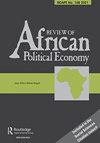How capitalism is destroying the Horn of Africa: sheep and the crises in Somalia and Sudan
IF 1.4
3区 社会学
Q1 AREA STUDIES
引用次数: 0
Abstract
SUMMARYGiven the current turmoil in the Sahel and Sudan, this debate piece addresses an important absence in the commentary. While self-serving explanations relating to climate change, avaricious generals and entrenched ethnic tensions abound, there is little on the deepening crisis within the agro-pastoral economy that directly affects millions of toiling people across the entire region. With reference to the spectacular, but largely ignored, growth in livestock exports from the ostensibly impoverished Horn to the urbanising Gulf states, we argue that over several decades, neoliberalism has transformed the erstwhile reciprocity between ‘farmers’ and ‘herders’ into a relation of permanent war. Favouring armed actors, the historic affinity between merchant capital and raw violence as an economic relation has produced a violent and expansive extractive economy. This internationally facilitated mode of appropriation, with its associated acts of land clearance, dispossession and displacement, is the root cause of the current crisis.KEYWORDS: Livestock tradewaragro-pastoralismneoliberalismurbanisationprimitive accumulationde-developmentclearancesdispossession Disclosure statementThe authors declare no conflict of interest.Notes1 In 2017, the combined ruminant livestock exports of these countries was 5.6 million heads (source: FAOSTAT).2 Mostly involving the period between1970 and 2021, our reworking of this data is contained in 24 graphs covering the Gulf and Horn livestock trade; selected Gulf development data; and Sudan and Somalia international aid data. These graphs can be found in the Supplementary Materials.Additional informationNotes on contributorsMark DuffieldMark Duffield is an Emeritus Professor and former director of the Global Insecurities Centre, University of Bristol. In the 1980s, he was Oxfam’s Country Representative, Sudan.Nicholas StocktonNicholas Stockton is a former Senior Humanitarian Advisor with the UN Office for the Coordination of Humanitarian Affairs (UNOCHA), former Director of the Humanitarian Accountability Partnership, former Emergencies Director of Oxfam GB and former Oxfam GB representative in Southern Sudan and Uganda. Both have spent decades variously critiquing capitalism and questioning the international aid industry.资本主义是如何摧毁非洲之角的:绵羊和索马里和苏丹的危机
鉴于目前萨赫勒地区和苏丹的动荡,这篇辩论文章弥补了评论中一个重要的缺失。尽管有关气候变化、贪得无厌的将军和根深蒂固的民族紧张关系的自私解释比比皆是,但对农牧经济内部日益加深的危机却鲜有提及,这种危机直接影响到整个地区数百万辛勤劳动的人民。关于从表面上贫穷的非洲之角到正在城市化的海湾国家的牲畜出口的惊人增长,但在很大程度上被忽视,我们认为,在过去的几十年里,新自由主义已经把过去“农民”和“牧民”之间的互惠关系转变为一种永久的战争关系。作为一种经济关系,商业资本和原始暴力之间的历史亲缘关系有利于武装行动者,产生了一种暴力和扩张的采掘经济。这种由国际推动的占有方式,以及与之相关的土地清理、剥夺和流离失所行为,是当前危机的根源。关键词:畜牧贸易,农业,畜牧业,新自由主义,城市化,原始积累,发展,清理,剥夺,披露声明作者声明无利益冲突。注1 2017年,这些国家的反刍牲畜出口总额为560万头(来源:粮农组织统计数据库)主要涉及1970年至2021年期间,我们对这些数据进行了重新处理,包含在24张图表中,涵盖了海湾和非洲之角的牲畜贸易;选定的海湾开发数据;以及苏丹和索马里的国际援助数据。这些图表可以在补充资料中找到。作者简介mark Duffield是布里斯托尔大学全球不安全中心的名誉教授和前主任。1980年代,他曾担任乐施会驻苏丹代表。尼古拉斯·斯托克顿尼古拉斯·斯托克顿是联合国人道主义事务协调办公室(UNOCHA)前高级人道主义顾问,人道主义问责伙伴关系前主任,英国乐施会前紧急事务主任,英国乐施会前驻苏丹南部和乌干达代表。几十年来,他们都在批判资本主义,质疑国际援助行业。
本文章由计算机程序翻译,如有差异,请以英文原文为准。
求助全文
约1分钟内获得全文
求助全文
来源期刊

Review of African Political Economy
Multiple-
CiteScore
3.00
自引率
7.70%
发文量
29
期刊介绍:
The Review of African Political Economy (ROAPE) is a refereed journal committed to encouraging high quality research and fostering excellence in the understanding of African political economy. Published quarterly by Routledge, Taylor & Francis Group for the ROAPE international collective it has since 1974 provided radical analysis of trends and issues in Africa. It has paid particular attention to the political economy of inequality, exploitation and oppression, whether driven by global forces or local ones (such as class, race, community and gender), and to materialist interpretations of change in Africa. It has sustained a critical analysis of the nature of power and the state in Africa.
 求助内容:
求助内容: 应助结果提醒方式:
应助结果提醒方式:


